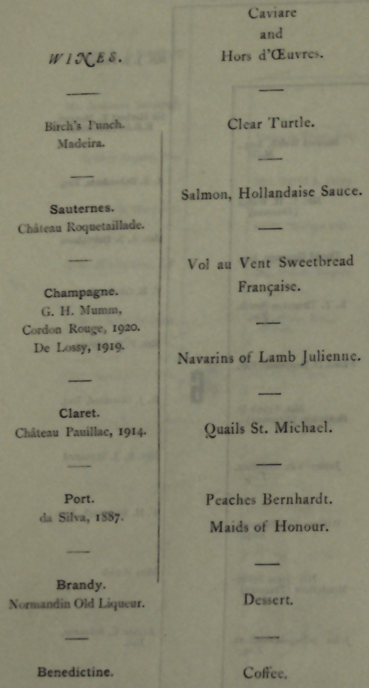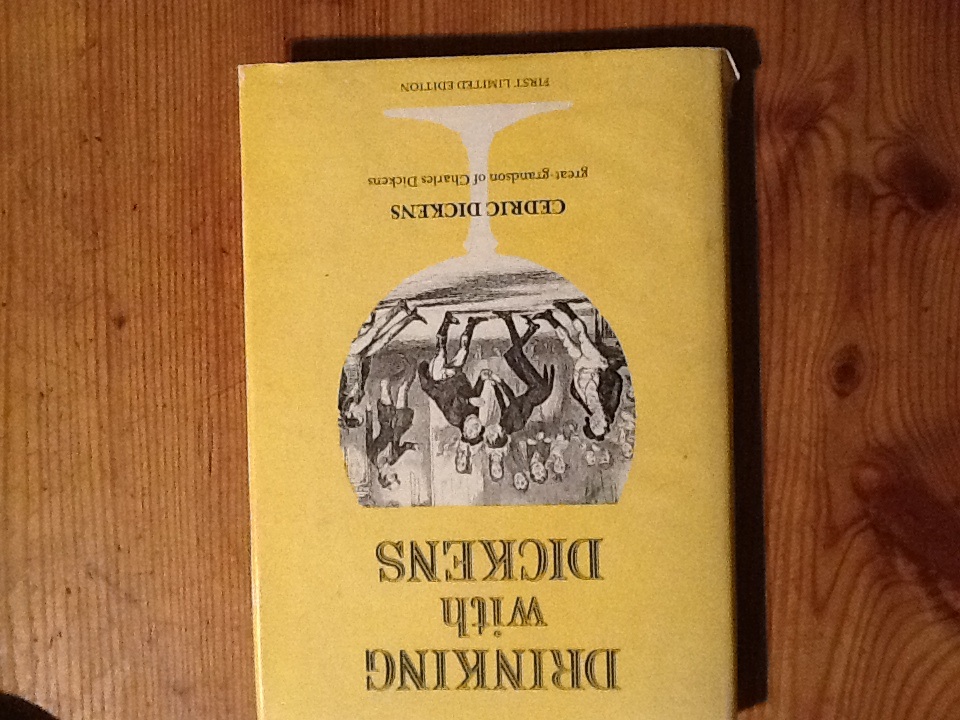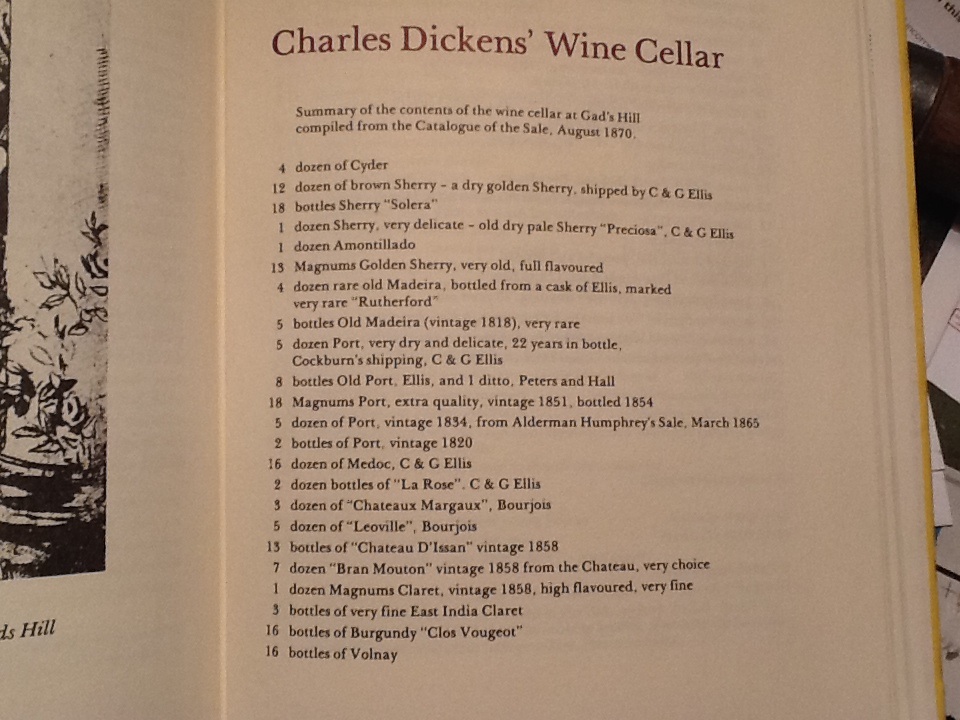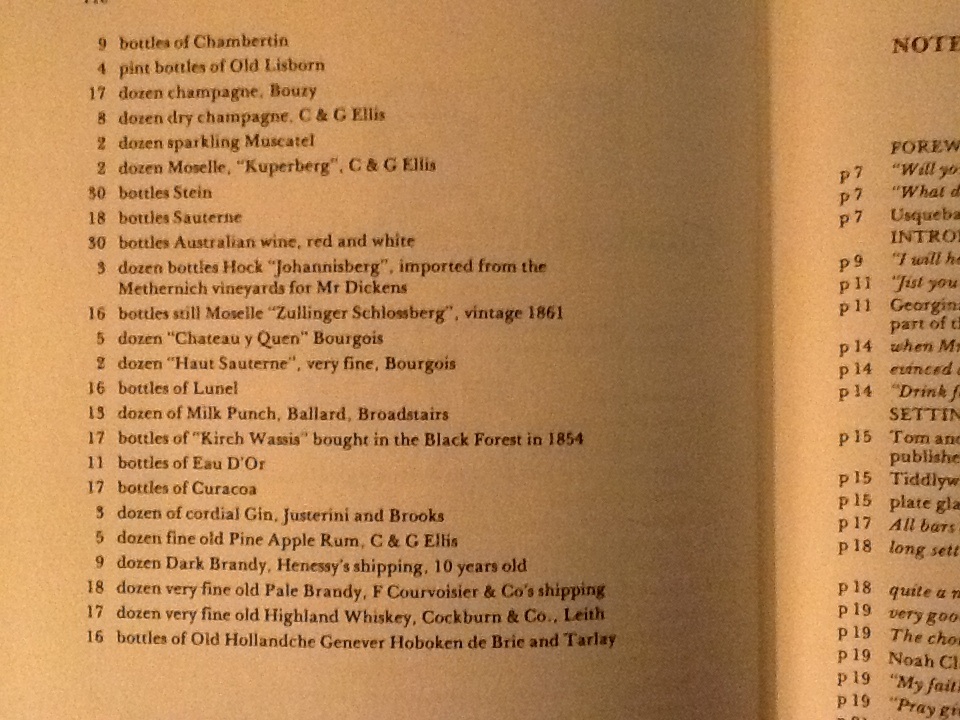Page 2 of 6
Re: Port and literature
Posted: 22:01 Fri 22 Nov 2013
by djewesbury
jdaw1 wrote:djewesbury wrote:Bernhardt?
The Worshipful Company of Gardeners of London, Ladies’ Banquet at Grocers’ Hall, Tuesday 13
th March 1928.

Ah, Peaches Bernhardt, Sarah's much less talented and, fortunately, edible half-sister.
Re: Port and literature
Posted: 23:41 Fri 22 Nov 2013
by jdaw1
djewesbury wrote:fortunately, edible
Serving suggestion: with Noval ’87.
Were the Maids honoured by being eaten?
Re: Port and literature
Posted: 00:01 Sat 23 Nov 2013
by LGTrotter
Was he right? Should we throw away our over the hill wines as spent passions?
Re: Port and literature
Posted: 19:33 Mon 25 Nov 2013
by LGTrotter
To return briefly to the question of the age; ie should we have drunk up our 1847 port by 1923, I see that the late great George Saintsbury said it was over and done by 1917. That is a good advocate on the side of Ms Sayers. I should think Andre Simon is now feeling pretty silly for saying it was drinking well in 1933.
Re: Port and literature
Posted: 19:36 Mon 25 Nov 2013
by djewesbury
LGTrotter wrote:To return briefly to the question of the age; ie should we have drunk up our 1847 port by 1923, I see that the late great George Saintsbury said it was over and done by 1917. That is a good advocate on the side of Ms Sayers. I should think Andre Simon is now feeling pretty silly for saying it was drinking well in 1933.
Oh my GOD. You are a port sleuth. What about the Dow 1878... When was that at its best?
Re: Port and literature
Posted: 19:42 Mon 25 Nov 2013
by LGTrotter
djewesbury wrote:LGTrotter wrote:To return briefly to the question of the age; ie should we have drunk up our 1847 port by 1923, I see that the late great George Saintsbury said it was over and done by 1917. That is a good advocate on the side of Ms Sayers. I should think Andre Simon is now feeling pretty silly for saying it was drinking well in 1933.
Oh my GOD. You are a port sleuth. What about the Dow 1878... When was that at its best?
Hold your last case and I will get back to you.
Re: Port and literature
Posted: 02:34 Tue 26 Nov 2013
by LGTrotter
LGTrotter wrote:To return briefly to the question of the age; ie should we have drunk up our 1847 port by 1923, I see that the late great George Saintsbury said it was over and done by 1917. That is a good advocate on the side of Ms Sayers. I should think Andre Simon is now feeling pretty silly for saying it was drinking well in 1933.
And Saintsbury produces a remarkably similar tasting note to Sayers. Compare; 'Truly enough the '47 port was a dead thing; the merest ghost of its old flame and flavour hung about it', with; 'When it was sixty years old and little but a memory, or at least a suggestion'. I think I should write a short monograph for the Dororthy L Sayers society.
Re: Port and literature
Posted: 09:02 Tue 26 Nov 2013
by jdaw1
There was a ’47 Club at the House of Commons, comprising members born that year, who would meet for port. Somewhere I have more information, should it be important.
Re: Port and literature
Posted: 09:25 Tue 26 Nov 2013
by Alex Bridgeman
LGTrotter wrote:LGTrotter wrote:To return briefly to the question of the age; ie should we have drunk up our 1847 port by 1923, I see that the late great George Saintsbury said it was over and done by 1917. That is a good advocate on the side of Ms Sayers. I should think Andre Simon is now feeling pretty silly for saying it was drinking well in 1933.
And Saintsbury produces a remarkably similar tasting note to Sayers. Compare; 'Truly enough the '47 port was a dead thing; the merest ghost of its old flame and flavour hung about it', with; 'When it was sixty years old and little but a memory, or at least a suggestion'. I think I should write a short monograph for the Dororthy L Sayers society.
Surely we shouldn't just take Sainstbury's and Simon's word for this? Should we not try the 1847 for ourselves to judge whether it is dead or whether it has life yet?
Re: Port and literature
Posted: 09:35 Tue 26 Nov 2013
by jdaw1
AHB wrote:Surely we shouldn't just take Sainstbury's and Simon's word for this? Should we not try the 1847 for ourselves to judge whether it is dead or whether it has life yet?
If you want an 1847 Horizontal then start a thread in the appropriate place. I’m in, but would have to adopt.
Re: Port and literature
Posted: 13:34 Tue 26 Nov 2013
by LGTrotter
djewesbury wrote: What about the Dow 1878... When was that at its best?
The only note so far is from Mr Broadbent. In the late sixties/early seventies it was still going strong. This is not the last word as I have some other sources to consult.
Re: Port and literature
Posted: 23:38 Thu 26 Dec 2013
by DRT
I have just ordered a copy of
Grimpil's Retrogress after stumbling across that website whilst googling something else.
I will report back.
Port and literature
Posted: 14:29 Sun 04 May 2014
by djewesbury
Not having visited one of our offlines yet, LGTrotter has missed a port reference in the works of Miss Sayers, of which he is otherwise the undisputed master.
In
Strong Poison, Lord Peter Wimsey has planted a spy in the office of Mr Norman Urquhart, solicitor. Miss Murchison, Wimsey's plant, is picking the lock of a deed box, having stayed late after work. But she realises she can be seen from the street, the office having no blinds at the window.
Dorothy L. Sayers wrote: … under the glare of the electric light, her movements were as visible to anybody in the street as though she stood on a lighted stage […] Moreover, if a policeman should pass by, would he not be able to recognise pick-locks a hundred yards away? She peered out again. Was it her agitated fancy, or was that a sturdy form in dark blue emerging from Hand Court?
You're quite all right, Miss Murchison. The sturdy form is DRT emerging from the Bung Hole, where he was enquiring after
his missing decanting funnel.
Re: Port and literature
Posted: 16:27 Sun 04 May 2014
by LGTrotter
Sturdy? Surely a well formed man moving with the ease and grace of a tiger would have put me more in mind of DRT? Svelte was the word I was searching for.
Re: Port and literature
Posted: 16:58 Sun 04 May 2014
by djewesbury
Yes yes. Of course.
Re: Port and literature
Posted: 22:58 Sun 11 May 2014
by jdaw1
jdaw1 wrote:Seal colours were not widely recorded at that time. However, the Worshipful Company of Fishmongers’ stock list of January 1876, includes 4 dozen and 11 of ‟Beachcroft” 1847, ‟Green Seal”, purchased in 1875.
…
Of course, perhaps Beachcroft was a BOB for Taylor, and ’47 would have been rather young in ’55.
Messrs. Christie, Manson & Woods, on 23
rd May 1874, sold “The Cellar of Wines of Algernon Perkins, Esq., Deceased, Late of Hanworth Park and Harley Street”. Lots 16 to 24 totalled almost 26 “Dozens of Port (Beachcroft and Wilson), bottled 1855, black seal”, at prices from 64/- to 72/- per dozen.
(Note to self: pictures 18606-10.)
Re: Port and literature
Posted: 21:16 Tue 03 Jun 2014
by LGTrotter
I have been reading 'A matter of taste; a history of wine drinking in Britain' by Jon Hurley. It is the first wine book with a chapter on port that I can't find on the 'books about port' website. It is readable and and scholarly enough without being turgid. I bet the bloke who runs the website would rate it three stars, same as everything else.

Re: Port and literature
Posted: 21:55 Tue 03 Jun 2014
by djewesbury
jdaw1 wrote:jdaw1 wrote:Seal colours were not widely recorded at that time. However, the Worshipful Company of Fishmongers’ stock list of January 1876, includes 4 dozen and 11 of ‟Beachcroft” 1847, ‟Green Seal”, purchased in 1875.
…
Of course, perhaps Beachcroft was a BOB for Taylor, and ’47 would have been rather young in ’55.
Messrs. Christie, Manson & Woods, on 23
rd May 1874, sold “The Cellar of Wines of Algernon Perkins, Esq., Deceased, Late of Hanworth Park and Harley Street”. Lots 16 to 24 totalled almost 26 “Dozens of Port (Beachcroft and Wilson), bottled 1855, black seal”, at prices from 64/- to 72/- per dozen.
(Note to self: pictures 18606-10.)
… 'and literature'?
Re: Port and literature
Posted: 22:19 Tue 03 Jun 2014
by LGTrotter
djewesbury wrote:… 'and literature'?
And you waited how long to make this point?
I have found a brief reference to port in Candide;
'Pangloss was in the middle of his sentence when the officer nodded to his henchmen, who was pouring him out a glass of port wine.'
But then, so little consideration is given to the rebuffing of Liebnitz's philosophy on

I am not surprised it went unremarked until now.
Re: Port and literature
Posted: 22:22 Tue 03 Jun 2014
by djewesbury
Owen it was only your erudite revival of the thread that alerted me to its earlier abuse. So you see, you have only yourself to thank. Now I must go looking for references to port in Charles B.
Re: Port and literature
Posted: 22:33 Tue 03 Jun 2014
by AW77
LGTrotter wrote:
But then, so little consideration is given to the rebuffing of Liebnitz's philosophy on

I am not surprised it went unremarked until now.
I think

has to deal with Leibniz first.

Re: Port and literature
Posted: 22:41 Tue 03 Jun 2014
by LGTrotter
djewesbury wrote:Owen it was only your erudite revival of the thread that alerted me to its earlier abuse. So you see, you have only yourself to thank. Now I must go looking for references to port in Charles B.
Bukowski? You are in a dark place.
AW77 wrote:I think

has to deal with Leibniz first.

I wondered if you were out there, tried any 1540 Steinwien tonight?
Re: Port and literature
Posted: 22:42 Tue 03 Jun 2014
by djewesbury
I bet Bukowski drank more port than Baudelaire. Baudelaire probably only drank Tawny.
Re: Port and literature
Posted: 22:51 Tue 03 Jun 2014
by LGTrotter
“That's the problem with drinking port, I thought, as I poured myself a drink of port. If something bad happens you drink port in an attempt to forget; if something good happens you drink port in order to celebrate; and if nothing happens you drink port to make something happen.”
Adapted from― Charles Bukowski, Women
Re: Port and literature
Posted: 23:02 Tue 03 Jun 2014
by djewesbury
LGTrotter wrote:“That's the problem with drinking port, I thought, as I poured myself a drink of port. If something bad happens you drink port in an attempt to forget; if something good happens you drink port in order to celebrate; and if nothing happens you drink port to make something happen.”
Adapted from― Charles Bukowski, Women

Re: Port and literature
Posted: 23:14 Tue 03 Jun 2014
by AW77
LGTrotter wrote: I wondered if you were out there, tried any 1540 Steinwien tonight?
No, but a 2009 Gewürztraminer Auslese with desert. I was surprised that Gewürztraminer gets dryer with age, too.
Re: Port and literature
Posted: 23:15 Tue 03 Jun 2014
by djewesbury
AW77 wrote:LGTrotter wrote: I wondered if you were out there, tried any 1540 Steinwien tonight?
No, but a 2009 Gewürztraminer Auslese with desert. I was surprised that Gewürztraminer gets dryer with age, too.
Just like Owen

Re: Port and literature
Posted: 23:17 Tue 03 Jun 2014
by LGTrotter
AW77 wrote:LGTrotter wrote:Liebnitz
Leibniz
'Let's call the whole thing off', or as one DJewesbury put it 'let's fall asleep on a bench'. ('Bench' in the search box will find the reference.)
Re: Port and literature
Posted: 23:23 Tue 03 Jun 2014
by djewesbury
I'm keeping your seat warm.
Re: Port and literature
Posted: 23:33 Tue 03 Jun 2014
by LGTrotter
djewesbury wrote:I'm keeping your seat warm.
I feel all Charles Hawtree...
Re: Port and literature
Posted: 21:36 Sun 15 Jun 2014
by djewesbury
More from Ms Sayers. Nine Tailors. Having already had a bottle of claret with his lunch, Peter Wimsey has opened a bottle of Tuke Holdsworth 08 (the same vintage that the Rector remarks 'couldn't hurt a fly' at the beginning of the book, which Owen noted elsewhere).
' "This is very excellent port. Be good enough to finish the bottle, Bunter, because it would be a pity to waste it and if I have any more I shall be too sleepy to drive." '
This is in a book where he's already managed to drive his Daimler into a ditch...
Re: Port and literature
Posted: 08:55 Mon 16 Jun 2014
by djewesbury
Interesting crossover from Port and Literature to Port and Art. I think the famous C19th painter Henry Scott Tuke, best known for his paintings of young boys swimming and boating, was of the family of port shippers. I forget where I read this. I'll research it again.
Re: Port and literature
Posted: 20:26 Tue 17 Jun 2014
by AW77
The third (I think) reference to port in Graham Greene.
In his novel "It's a Battlefield" (in the 2002 Vintage paperback on page 35) he writes:
"... Suddenly through the stillness, like the ghost of old dinners, he heard a nut crack. He stayed very still, half expecting to smell the bouquet of port, to hear the clink of a glass, but there was a silence..."
Re: Port and literature
Posted: 22:57 Tue 17 Jun 2014
by LGTrotter
I think there is a passing reference to port in what is undoubtably his most exquisite work 'The end of the affair'.
Re: Port and literature
Posted: 18:35 Mon 30 Jun 2014
by PopulusTremula
In "A spy among friends", Nicholas Elliott, after gaining employment in some clandestine section of the Foreign Office, underwent induction training comprising of the following sage advice:
"After dinner, Sir Nevile [Bland] offered him a warning: 'in the diplomatic service it is a sackable offence to sleep with the wife of a colleague' - and some advice: 'I suggest you do as I do and not light your cigar until you have started your third glass of port.'"
Re: Port and literature
Posted: 23:01 Mon 30 Jun 2014
by DRT
PopulusTremula wrote:In "A spy among friends", Nicholas Elliott, after gaining employment in some clandestine section of the Foreign Office, underwent induction training comprising of the following sage advice:
"After dinner, Sir Nevile [Bland] offered him a warning: 'in the diplomatic service it is a sackable offence to sleep with the wife of a colleague' - and some advice: 'I suggest you do as I do and not light your cigar until you have started your third glass of port.'"
If John Terry had read that book perhaps England would have done better in the World Cup.
Re: Port and literature
Posted: 21:00 Wed 23 Jul 2014
by LGTrotter
PopulusTremula wrote:In "A spy among friends", Nicholas Elliott, after gaining employment in some clandestine section of the Foreign Office, underwent induction training comprising of the following sage advice:
"After dinner, Sir Nevile [Bland] offered him a warning: 'in the diplomatic service it is a sackable offence to sleep with the wife of a colleague' - and some advice: 'I suggest you do as I do and not light your cigar until you have started your third glass of port.'"
Looked this up and on the basis of a few reviews I have ordered a copy. An interesting locus of history.
Re: Port and literature
Posted: 21:49 Wed 23 Jul 2014
by PopulusTremula
LGTrotter wrote:PopulusTremula wrote:In "A spy among friends", Nicholas Elliott, after gaining employment in some clandestine section of the Foreign Office, underwent induction training comprising of the following sage advice:
"After dinner, Sir Nevile [Bland] offered him a warning: 'in the diplomatic service it is a sackable offence to sleep with the wife of a colleague' - and some advice: 'I suggest you do as I do and not light your cigar until you have started your third glass of port.'"
Looked this up and on the basis of a few reviews have ordered a copy. A interesting locus of history.
I enjoyed it. Well written and gripping, easy reading rather than peer reviewed history journal.
Re: Port and literature
Posted: 20:56 Sun 10 Aug 2014
by LGTrotter
PopulusTremula wrote:I enjoyed it. Well written and gripping, easy reading rather than peer reviewed history journal.
Me too, especially the John le Carre bit at the end.
Re: Port and literature
Posted: 19:38 Sun 31 Aug 2014
by LGTrotter
I was trying to remember the lovely line about being 'fuddled with port' from Evelyn Waugh's Scoop. In the end I googled it to find reference to it from an earlier source and very pleasing it is too. First the Waugh quote;
"William sat in a happy stupor. He had never wanted to go to Ishmaelia, or, for that matter to any foreign country, to earn £50 a week or own a jointed flagstaff or a camp operating table; but when he told Mr Salter that he wanted nothing except to live at home and keep his job, he had hidden the remote and secret ambition of fifteen years or more. He did, very deeply want to go up in an aeroplane. It was a wish so far from the probabilities of life at Boot Magna that William never spoke of it; very rarely consciously considered it. No one at home knew of it except Nannie Bloggs. She had promised him a flight if she won the Irish Sweepstake, but after several successive failures she decided that the whole thing was a popish trick and refused to take further tickets, and with her decision William’s chances seemed to fade beyond the ultimate horizon. But still it haunted his dreams and returned to him, more vividly in the minutes of transition between sleep and wakefulness, on occasions of physical exhaustion and inner content, hacking home in the twilight after a good day’s hunt, fuddled with port on the not infrequent birthdays of the Boot household."
The next from 'The Golden age' Thursday September 26th 1861;
Major Montresor’s dream; The Major, a good practical unfilligreed Christian, one day at Oxford, having been much fuddled with port and polemics, fell asleep after dinner and found himself in an immense crowd pressing on towards the gates of heaven.'
It goes on to tell the tale, here is the link;
http://trove.nla.gov.au/ndp/del/article/30631709
I just love the turn of phrase 'fuddled with port' so expressive of the joys of having a glass or three.
Re: Port and literature
Posted: 22:24 Wed 03 Sep 2014
by djewesbury
Very lovely. Thank you. The Scoop quote is quite beautiful.
Re: Port and literature
Posted: 20:07 Tue 09 Sep 2014
by AW77
I found a possible reference to Port in Compton Mackenzie's "The Monarch of the Glen":
"But this was the kind of talk which suited a dying fire and an empty decanter." (p. 21)
This must surely be a decanter of port.
Re: Port and literature
Posted: 13:22 Sun 21 Sep 2014
by AW77
I found a definite reference to Port in Compton Mackenzie's "The Monarch of the Glen":
"Yes, you've already made that clear," Lord Buntingdon interrupted. "Fill up your glass, Mr Prew," he added, pushing the decanter of port towards his guest. "Thank you, no, Lord Buntingdon. I find that more than one glass of port tends to aggravate my rheumatism." (p. 166)
Re: Port and literature
Posted: 16:55 Sun 21 Sep 2014
by LGTrotter
Rheumatism? I wonder if this was a euphamism for gout? And surely two glasses couldn't hurt, not if they are small ones?
Re: Port and literature
Posted: 00:04 Sun 12 Oct 2014
by LGTrotter

- image.jpg (250.24 KiB) Viewed 22005 times
This book has a small but excellent piece on port. Bought at Yarcombe terrier races (this features high in the local calendar). I shall try to post more when sober.
Re: Port and literature
Posted: 00:35 Sun 12 Oct 2014
by LGTrotter
LGTrotter wrote: I shall try to post more when sober.
I couldn't wait that long, perhaps I should post this among Julian's auction catalogues but I felt that the contents of Dickens' cellar deserved to be in the literature thread. Lots or madeira; good. Magnums of port; better. Plenty of cider; huzzah!

- image.jpg (210.56 KiB) Viewed 21999 times
Re: Port and literature
Posted: 00:46 Sun 12 Oct 2014
by LGTrotter
Even Glenn could have had a glass of port he liked, the Cockburn which had been in cask for 22 years, for instance. No indication of a bottling or vintage though. Must have dragged the price down.
Re: Port and literature
Posted: 00:57 Sun 12 Oct 2014
by LGTrotter
Just realised the cellar list goes on over the page.

- image.jpg (253.3 KiB) Viewed 21996 times
Re: Port and literature
Posted: 08:04 Sun 12 Oct 2014
by jdaw1
Please post more about the secondary source.
Re: Port and literature
Posted: 21:41 Sun 12 Oct 2014
by LGTrotter
jdaw1 wrote:Please post more about the secondary source.
My information is limited to the book itself. Already ably reviewed on 'Books about Port' site, it is written by the great grandson of the original Dickens. It is slimmish and from a cursory read it has thrown up a number of nuggets. One being the précis of the Gads Hill auction catalogue sold after the death of Dickens which I have posted. There are the usual series of still blindingly marvellous quotes, alongside rather more modern observations by a rather less talented Dickens. He does however have his merits, a solid recipe for negus and smoking bishop are always welcome. He also has some interesting connections and stories, but I doubt they would scintillate most readers. Published in 1980 it has the feel of something from the fifties, or even the thirties. And there is a chapter entitled "The great port controversy"; is that not enough?
